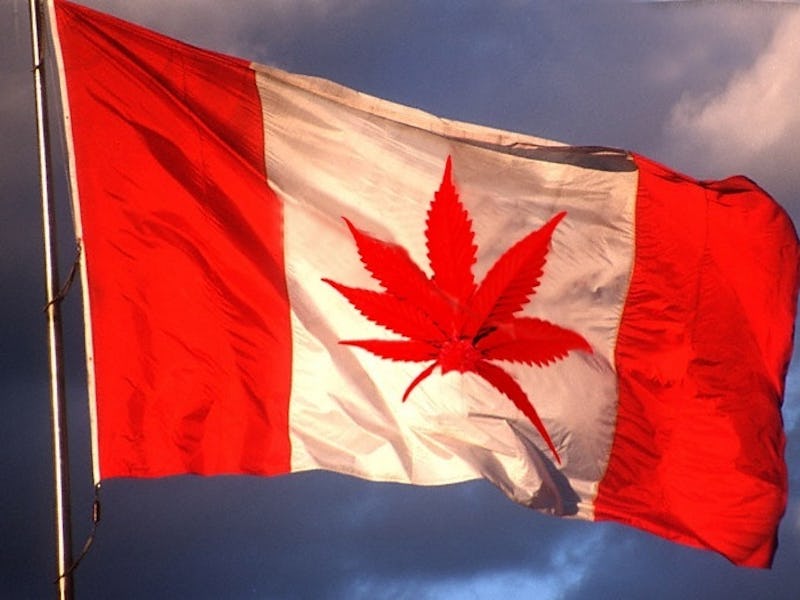It's High Time the U.S. Cloned Canada's Medical Pot Model
The great green north's streamlined pot prescription process is #weedgoals.

America’s presidential candidates have been conspicuously cagey about the status of federal medical marijuana legalization during this campaign season, suggesting that state officials are in for at least another four years of slapdash lawmaking and enforcing. In Canada, however, getting medical marijuana is a federally regulated, streamlined process akin to getting a library card or ordering an Uber. Attempting to do the same stateside can be a pain in the ass, especially if you’re in one of the the 25 states where medical pot isn’t legal.
But things might be looking up as restrictions on pot research loosen and legalization enjoys growing acceptance. In a future where the United States legalizes medical marijuana, the precedent Canada has set will guide lawmakers on what — and what not — to do. Here are the most salient lessons from the great green north.
Get National Healthcare
Medical marijuana has been legal in Canada since 2001, a year after it was decided that the historical prohibition on the drug conflicted with the nation’s Charter of Rights and Freedoms. Since then, physicians have been free to prescribe marijuana (or not) to patients, though sourcing it hasn’t always been so straightforward. The country’s centralized healthcare system, Health Canada, was originally responsible for producing and providing dried-up marijuana, but patients were briefly given the freedom to grow their own weed. When this proved too complicated to regulate in 2014, weed dispensation duties were handed off to eleven federally recognized weed distributors, which collectively control all of the medical marijuana in the country today.
Justin Trudeau's government has proposed federal legalization of medical and recreational marijuana, which may be implemented as early as April 2017.
Get Experts To Make Decisions
Acquiring a medical marijuana prescription is not too different from getting one for painkillers or anti-anxiety medication. That is to say, getting one largely depends on the views of your family doctor.
The official guidance of the College of Family Physicians of Canada recommends that doctors only prescribe medical pot to patients dealing with certain types of chronic pain — like cancer or diseases of the nerves — or as a medical aid, like improving appetite and deal with anorexia and nausea. Regardless of the ways pot is used casually, it isn’t recommended to treat anxiety or insomnia, and it’s not supposed to be prescribed to patients under 25. Still, the final decision is ultimately left to the physician.
Canadian physicians may prescribe pot to treat neuropathic pain, anorexia, and nausea, together with these diseases.
Get Cannabis Clinics
Doctors aren’t required, by law, to write you a prescription if they don’t believe medical marijuana will help you — and despite Canada’s weed-happy reputation, there are plenty of physicians who believe more conventional treatments will suffice — but they are obliged to direct patients to another physician who might. They are most likely to direct patients toward a walk-in cannabis clinic, like those operated by Canadian Cannabis Clinics, which, ideally, will have a physician on staff to assess patients; however, because much of the medical community is still getting used to the idea of weed as medicine, cannabis clinics have been experiencing difficulties finding doctors to join their teams.
Get Online
Cannabis clinics in rural areas or regions where pro-marijuana physicians are scarce are often equipped with a “Doc in a Box” — the medical community’s term of endearment for video-conferencing doctors, who meet with patients over a video call to assess their symptoms and listen to their vital signs via internet-equipped stethoscopes, operated by an on-site nurse.
Get Centralized
Whether you get your prescription from your physician or from a doctor at a cannabis clinic, it will ultimately be filled by one of Canada’s eleven federally approved producers. Companies like Bedrocan, Tweed, and Aphria are equipped to receive electronic prescriptions, process them, and send carefully measured doses by mail to patients. (They even do refills!)
Get Legal
Canada’s medical marijuana prescription process still has minor kinks to iron out, but it’s very likely those will be moot come April 2017. The federal legalization of all weed has been rumored since Justin Trudeau’s government announced in April that it would roll out a new marijuana policy, and its implementation would result in pot being treated essentially like alcohol: licensed by the federal government but supplied by private producers and available to all citizens over legal marijuana age.